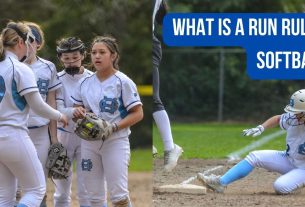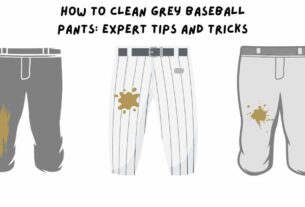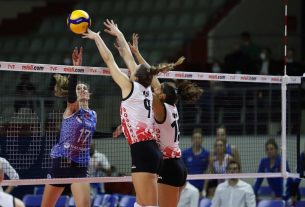It’s summer. The sun is shining. And it’s time to play some ball. But what size softball for 10u? There are a lot of factors to consider when choosing the best softball for your ten-year-old. It all starts with the type of bat and ends with getting a glove that fits. Before looking at how you can make sure your kid gets a fitting glove, regardless of their hand size or gender.
What Is 10u Softball?
10U softball is the level of play before kids move up to “regular” fast-pitch softball, which they typically begin around age 11.
This type of softball is also referred to as “machine pitch”. Because instead of throwing to the batter, a pitching machine pitches balls to the batter at a range of speeds.
It has this built-in advantage for batters, 10U softball is meant to be the first step for players who are just learning the ropes. It teaches them how to stand in the batter’s box and swing confidently. As a result, when they move up to pitchers their age and older, they don’t have to worry so much about getting hit by an incoming ball.
The transition from 10U to fast-pitch can be tricky. But if your kid sticks with it through that transition period and continues playing regular fast-pitch past age 12 or 13, there’s a good chance she’ll develop into a strong player and athlete.
What Size Softball For 10u?
In the age of information or misinformation, depending on who you ask, it’s hard to know where to find the truth. If you’re looking for guidance on how to find the right size softball for 10U, then you’ve come to the right place.
The first thing you need to know is that the age of the players will determine what size softball they need. In general, a player under 7 to 8 years old should use a 10-inch softball, while players between 10 years old can use an 11-inch softball.
In addition to age, there are other factors that should be taken into consideration when it comes time for your team to purchase a new set of balls. Body types vary from child to child, so it’s important that each player has a ball that he or she can comfortably hold and swing without any problems.
For example, a shorter player may need a smaller ball than his teammates. Because her arm length isn’t as long as theirs or she may have trouble gripping larger balls with two hands.
It’s also important to consider weight when choosing your softballs. A ball that weighs less than six ounces is too light for most kids. This could cause them to hit harder than usual and possibly injure themselves.
Can you steal in 10U softball?
The answer is no, not all the time. But there are some restrictions and limitations on what you can do.
As a rule of thumb stealing is allowed in 10U fastpitch softball but with some limitations and restrictions. For example, each runner can only steal one base per inning. A runner cannot advance more than one base if a catcher overthrows a base. The runner can only advance to the next base if the ball is thrown out of play.
You may be wondering how this works for your league and if stealing is even allowed at all. Let’s take a look.
Since stealing is allowed in 10U fastpitch softball but with some limitations and restrictions, there are two types of steals that apply to situations. Here, the runners try to advance beyond their starting line-ups without making contact with another player or fielders:
- Stealing bases
- Advancing on overthrows by the catcher (also known as wild pitches)
Both involve runners taking risks when they move away from their original position as part of an attempt. This helps to reach home plate faster than other players can reach it before them (or just get out).
Can You Bunt In 10u Softball?
Yes, you can! It’s definitely a skill that you’re going to want to master if you want to be a successful player.
In 10U softball, bunting is one of the most effective ways to advance runners on base. That’s because the field isn’t very big, and the infielders are usually pretty young kids who can’t throw very far or very fast. Bunting allows you to get on base without needing a hit or walk. But it can also backfire badly if you don’t have the right skills or knowledge.
It also helps keep your team in scoring position by moving any runners already on base closer to home plate. You can even use bunting as a strategy if there are no runners on base by bunting when there are two strikes against you. This helps prevent an out and gives your teammates another chance at bat!
The biggest problem with bunting is that it takes a LOT of practice to get good at doing it. And even then, there’s still no guarantee that your bunt will be effective. You need to pay attention to how much power you put into your swing (too much and your ball will go further than intended). In addition, how far away from the home plate you stand (too close and your bunt will go out of play). Also, whether or not there’s anyone covering first base (if not, they’ll be able to catch your bunt before reaching safety). It’s easy to make mistakes when bunting!
Is 10u Softball-Fastpitch?
Yes, 10U softball is fast pitch.
10U softball is a competitive sport that incorporates elements of baseball and softball. In this sport, players are categorized by age into two groups: 10-and-under (10U), and 11-and-over (11U).
Players in the 10U category must be at least 8 years old, but younger than 11 years old. If they are between the ages of 8 and 10, then they may play in the 10U division. Players in the 11U category must be 11 years old or older.
Since this is a school sport, it does not depend on a player’s birthdate. However, if one is still under the age of 18 when they turn 13 years old, then they may participate in either division.
The purpose of fastpitch softball is to provide an opportunity for young girls. It helps them to play the game in an environment where they can learn the basic skills and strategies of fielding, hitting, and throwing.
Difference Between 10u And 12u Softball
As your child gets older, they may have the opportunity to play in different age groups within their sport. This can be confusing for parents and children alike: is there a difference between 10U softball and 12U? Is one group better than the other? What will my kid get out of playing with these different teams?
To clear up any confusion, we’re here to help you understand the differences between 10U and 12U softball teams:
Age
While the names 10U and 12U might not sound like they mean much, there’s a key difference between them: age. 10U softball leagues are for players who are under 10 years old, while 12U softball leagues are for players that are under 12. If you want to play in a certain league, then this is the first thing that you need to consider. If you’re over the cutoff age, then you must play in an older league.
Rules
The rules of softball change from league to league. In some leagues, there may be no base stealing allowed, or there may be restrictions on how far a runner can lead off of a base before going back. However, if you’re comparing the rules of two different leagues that are grouped together by age, then it’s likely that those leagues have the same rules.
Competition Level
Depending on where you live, there may be more competition at one level than another. Some areas may have more 10U teams than 12U teams. If you want to join a team where kids will get equal playing time, then this is an important factor to consider. On the other hand, if your child is experienced enough to play in a competitive league and has a good shot at starting every game, then look for a higher-level competition.
Coaches
Coaches who work with 10U teams often have less experience than coaches who work with 12U teams. In fact, some 12U coaches have played softball professionally or even at the college.
What Age Plays 10u Softball?
The short answer is: it depends on the league.
10U softball can include players who are 8 or 9 years old, and some leagues even have 11-year-olds in their 10U division. Typically, if you see in a little league, you’ll find that 8 and 9-year-olds play in the 10U division. But if you see in a recreational league, you may find a wider age range of players in the same division.
So how do you determine which age group your child plays in? There’s no right answer, It all depends on your child’s skill level and the rules of your league. It’s a good idea to check with the coach of your child’s team to find out what they think is appropriate for each player.
If you’re still unsure, there are several ways to get an idea of how old a player should be playing at each level. One way is through online resources or by talking to coaches from other teams in your area who have experience coaching different age groups within baseball.
Conclusion
For 10u players, an 11-inch softball is a perfect size. And for younger players, the smaller ball is recommended. For older players, the larger ball can be used. However, it is important to consult with a coach or league administrator to ensure that the correct size softball is being used.



